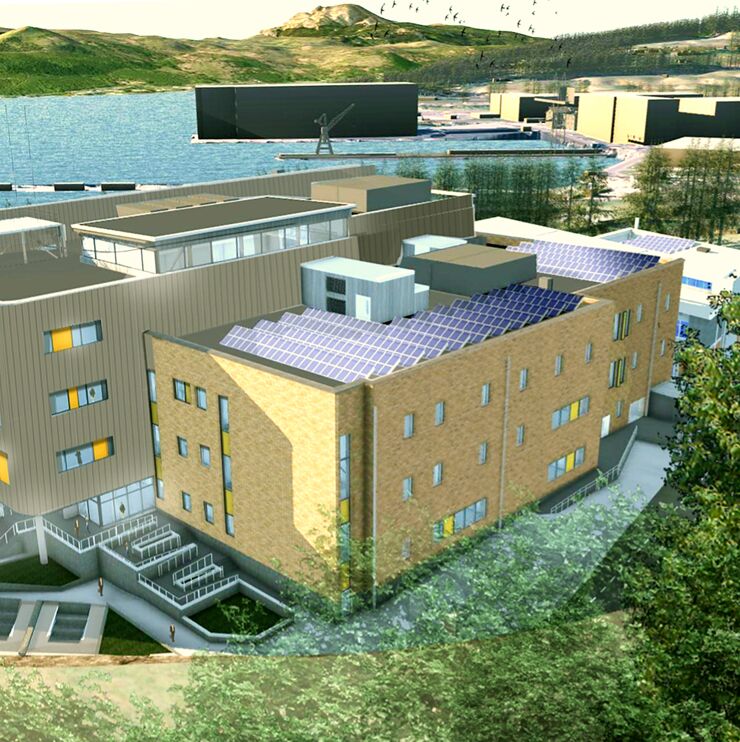
 |
NEC Contract of the Year Highly Commended 2019 |
The Ministry of Defence is using an NEC4-based framework to procure a £1.3 billion, 10-year refit of its nuclear submarine base on the Clyde estuary in Scotland. Called the Clyde Commercial Framework, it was highly commended for the NEC Contract Innovation of the Year Award in 2019.
Her Majesty’s Naval Base (HMNB) Clyde is the main home for the Royal Navy’s submarine service. The service operates nuclear-powered Vanguard class submarines, which carry the UK’s nuclear deterrent, and nuclear-powered attack submarines, which are currently based at both HMNB Clyde and HMNB Devonport in England.
The refit involves a programme of replacement, refurbishment and new-build projects at the submarine base at Faslane and the nearby Royal Naval Armaments Depot at Coulport. This programme of works will enable HMNB Clyde to be a single integrated operating base for the whole of the UK’s submarine fleet by 2024, including the new larger Dreadnought class submarines that start replacing the Vanguard class in 2028.
The bulk of the programme consists of complex refurbishment of nuclear infrastructure in high-security operational areas. It also includes new accommodation and welfare facilities for the submariners relocating from HMNB Devonport and a state-of-the-art submarine training school.
NEC4 Frameworks
In May 2018 the government’s Defence Infrastructure Organisation (DIO) awarded three 10-year NEC4 Framework Contracts (FC) for the Clyde refit to contractors VolkerStevin, Kier Graham Defence and Morgan Sindall.
Works packages from £1 million to £200 million will be allocated either by competitive tender or direct award. They will be let primarily under the NEC4 Engineering and Construction Contract (ECC) Option C (target contract with activity schedule) but with flexibility to use ECC Option A (priced contract with activity schedule), or ECC Option E (cost reimbursable contract) where appropriate. The NEC4 Engineering and Construction Short Contract (ECSC) will be used for small works and the NEC4 Engineering and Construction Subcontract (ECS) for subcontracts.
Services packages will be let under the NEC4 Professional Services Contract (PSC), Professional Services Short Contract (PSSC) or Professional Services Subcontract (PSS).
DIO appointed Mott MacDonald’s Glasgow office to provide the commercial expertise to develop the framework supported by DIO’s legal advisors Shepherd and Wedderburn LLP and independent collaborative behavioural specialists JCPii Ltd . DIO subsequently appointed Mott MacDonald as the NEC framework manager.
DIO commercial lead Ian Arbuckle says, ‘The contracts use the standard NEC4 terms and conditions with minimal use of Z clauses. Contractors are incentivised to collaborate and manage risk through framework-level key performance indicators, award fees and early completion bonuses.’
He says the framework also encourages and provides a contract mechanism for early contractor involvement. ‘This enables contractor input into the scope, programme and cost estimates for each package, helping to ensure it is delivered safely, on time, within budget and with minimum disruption to the Base.’
Changing Behaviours
Arbuckle says a key objective of the framework was to encourage a more collaborative approach to working in such a high-security, highly regulated and highly congested operational environment.
‘Historically HMNB Clyde has not been an easy place to work. The framework provides for joint collaborative behavioural training for all parties to help them work in NEC’s required “spirit of mutual trust and co-operation”, as well as joint NEC training.’
He says the framework requires face-to-face structured dialogue workshops for each package to discuss and understand its scope, constraints and each party’s issues. ‘We will also hold launch workshops to discuss the contractor’s tender and how all parties can make it more effective.’
A senior leadership team consisting of the DIO framework director, each contractor’s framework director and the framework manager meets monthly to steer the framework, set up the collaborative business processes, resolve disputes and score key performance indicators (KPI).
‘KPIs for each framework contractor are scored every month based on their performance in each package they are implementing and their overall collaborative behaviour. KPI scores are moderated by the client’s performance in each package and overall collaborative behaviour, such that they can increase. The contractor’s performance is then linked to payment of a monthly award fee on each of their packages, comprising an element of their fee matched by the client,’ say Arbuckle.
According to the NEC Award judges, the framework demonstrates, ‘Good use of the NEC4 Framework Contract to help build relationships and understanding over the 10-year period for this challenging works programme. The client is providing leadership by recognising the importance of collaborative relationships supported by a training programme and regular 360-degree feedback based on key performance indicators. Use of NEC4 contracts with minimal Z-clauses and early contractor involvement also supports this approach.’
Benefits of NEC
- NEC provides a comprehensive suite of back-to-back contracts for frameworks and individual works and services packages, with lump-sum, target cost and cost-reimbursable procurement options.
- NEC obligation of parties to work in a ‘spirit of mutual trust and co-operation’ promotes collaborative behaviours, helping to ensure works are delivered safely, to time and budget and with minimal disruption to operations.
- NEC flexibility enables framework contractors to be incentivised to collaborate and manage risk through framework-level key performance indicators, award fees and early completion bonuses.
- NEC provides a mechanism for early contractor engagement, enabling contractor input into the scope, programme and cost estimates for each works and services package to maximise efficiency and value for money.




